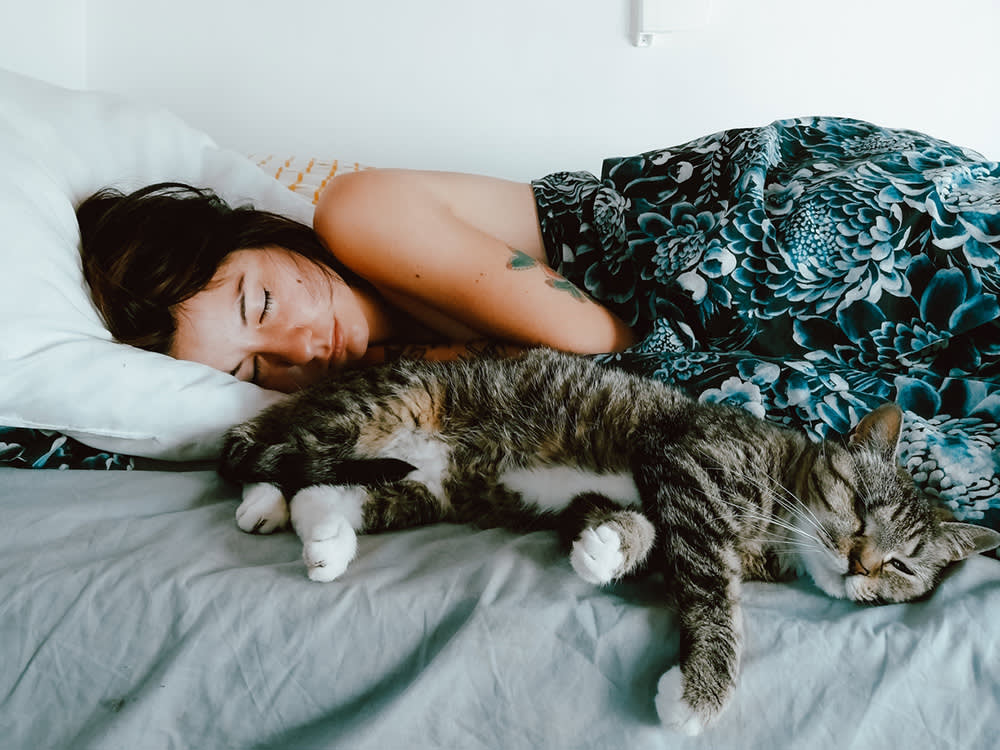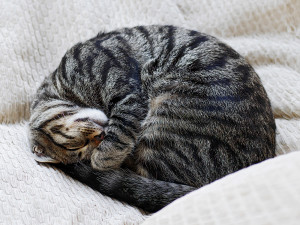Should Your Cat Sleep With You?
Here are the pros and cons of having a feline sleeping buddy
Letting your dog sleep in bed with you – though frowned upon by some people who prefer not to battle a four-legged creature for the duvet – is pretty common for parents of the canine set. In fact, dogs are central to the expression ‘three-dog night’, which refers to a night where temperatures are so bitterly cold that three dogs in the bed with you are necessary for you to stay warm.
A ‘three-cat night’ – perhaps not as warm because of body size, but every bit as cosy – may appeal to some of us. But even a one-or-two cat night may raise concerns for some people. Is it a good idea to have your cat sleep in the bed with you? There are, as in many decisions pet parents must make, both pros and cons to co-sleeping with your feline friends, and the decision about whether to share your bed with your cat is a personal one based on how the advantages and disadvantages of sleeping with your cat measure up against each other.
Is it safe to let my cat sleep with me?
If you have a cat, you know that pretty much any time is cat sleeping time. But at night, when you’re both trying to get some shut-eye, is it safe for you to do so together? Generally speaking, it’s safe for you to sleep with your cat. Cats are not in danger from sleeping with you, as long as they can get out from under the covers and are not trapped there. Yes, there is some risk of the transmission of disease, but by keeping your cat up to date on all immunisations and flea and tick control, as well as keeping the litter box clean, those risks are lessened. Adults sleeping with cats is one thing, but cats sleeping with young children does pose a serious risk. Since many cats love to sleep on our heads or near our faces, the risk of suffocation of babies, toddlers and young children is a real danger and a scary thought. Yes, it’s a rare occurrence, but one to be very aware of.
So, why does your cat sleep on you? Well, many cats sleep on top of us or next to us, and what that means is that our cats have something to gain by being near us. Some cats like to be on our chest, where they can feel us breathe and feel our hearts beat. These are soothing and comforting sounds and feelings for many cats. They may choose to be on us for warmth, to feel secure or because they love us, and being with us is one of the ways they show their affection. When your cat sleeps next to you or on top of you, they are probably feeling warm, secure and affectionate.
Can sleeping with my cat affect my sleep quality?
Sleeping with your cat can affect your sleep quality, but it’s difficult to predict whether having the cat in bed with you will have a negative effect on your sleep quality or not. Perhaps you will be one of the lucky ones who finds that sharing your bed with a cat improves the quality of your sleep. If you are a light sleeper, that is probably not going to be the case. Some cats want to play at bedtime, and that can make it harder to fall asleep, to stay asleep, and to sleep deeply. In other cases, the purring of the cat can be soothing and help you fall asleep, and the warmth and position of the cat can be better than any weighted blanket at helping you sleep peacefully with a feeling of security.
The noise of a purring cat might actually help you sleep
For many people, purring is like a white noise machine that makes sleep easier. The sound may drown out other sounds and make it easier to drift off, and it can be soothing. Even more amazing is the healing power of purring. The frequency of cats’ purrs are exactly the same frequencies that can be used to promote bone growth and healing of fracturesopens in new tab. These low tones are also beneficial in the treatment of pain, oedemaopens in new tab, breathing difficulties and muscle strain, among other conditions. That means that sleeping with your cat (if they purr) could be just what the doctor ordered.
Cats are better than even the best blanket
Cats keep you warm because their body temperature is higher than yours. They generously share their warmth with you (and you share yours with them) to make for a cosier night for everyone. If your cat sleeps peacefully on top of you rather than treating the bed like an amusement park, that may also help you sleep better just like using a weighted blanket can.
You’ll have security and comfort
Cats are less likely to be scared if they’re next to you, rather than if they were alone elsewhere in the house, which explains why so many cats like to sleep with their people. And, you will know when they are awake if you are right there with them; there is less chance of them doing anything destructive or mischievous in the house if you know where they are.
Having a cat in the bed with you can also lower your stress levels and your blood pressure. Many people report feelings of comfort and security when sharing a bed with their cat.
What are the disadvantages of letting my cat sleep with me?
Many people deny there is any disadvantage to letting their cat sleep with them, and in their case, it may be true. Sleeping with your cat is not for everyone, though. If you’ve tried co-sleeping with your kitty and haven’t liked it, you are not alone. Having a cat walking all over you throughout the night or yowling in your ear would definitely not be a recommendation from a reputable sleep specialist. Other people feel less clean with a cat in the bed, or they experience some health downsides.
What if my partner or family members are allergic to cats? (Or you have the allergy?)
If you or a partner suffer from allergies or asthma that are worse when with the cat, either of these medical conditions may be a deal breaker for co-sleeping with your cat, even if you really want to welcome them into the bed. Depending on the severity of the medical situation, you may or may not be able to make co-sleeping work, but you should definitely consult with a doctor for the best advice.
Some cats love night-time play
Some cats haven’t read the rules of home etiquette – especially the one that says night-time is for sleeping. Plenty of cats choose to play with you at night if they’re on the bed with you. Even cats who attempt to settle in for a cosy night may pounce on your feet or any other body part whenever you move it. Sleeping with a snoozing cat is wonderful, but sleeping with a playing cat is far less productive if the goal is a restful night.
You could get sick
There’s some risk of disease transmission whenever we spend time with other family members, no matter the species. In the case of cats, the best plan is to keep them healthy with regular veterinary care, to stay on top of any preventatives for fleas and ticks, and to keep the litter box clean to lessen the likelihood of them being exposed to anything there and sharing it with you when you sleep.
Many people wonder if they can get worms from the cat sleeping in the bed, and this is possible, though you’d have to ingest the eggs, so it’s not a likely scenario. If you have additional concerns about the transmission of disease or parasites, ask your cat’s veterinarian or your doctor any questions you have about your specific situation.
Dealing with litter box debris
Cats can track around cat litter wherever they go, and that may include your bed. The gritty feeling of cat litter is unpleasant anywhere, but especially when it’s in our sheets. (Under our feet on a wooden or tile floor is a close second.) Not only is litter unpleasant debris to have in bed with you, it’s not wonderful to have any part of your cat’s bathroom share the bed. The risks and the ick of this disadvantage can be kept to a minimum by regularly cleaning the litter box and your sheets, too.
It could cause relationship angst
Your partner might not be a huge fan of sharing the bed with the cat. It can cause a lot of conflict if one member of a couple wants the cat in the bed at night and the other half does not even want the cat in the bedroom at night. Coming up with a solution to this is more in the realm of a relationship counsellor than an animal behaviourist, but one option is to put a cat bed on the side of the bed. Just make sure the bed is on the side of the person who wanted the cat in the bedroom in the first place. That way, they’re the one who’s most likely to wake up if the cat decides to create any disturbances in the middle of the night.
Can I train my cat to sleep elsewhere if I prefer not to share the bed?
If your preference is not to share the bed with your cat, you can train them to sleep elsewhere. It’s easier to train your cat to sleep somewhere else from the beginning than to train them to sleep in a new place after they‘re used to sleeping in the bed.
Cats aren’t known for changing habits easily, and for good reason, so be patient if training your cat to sleep elsewhere involves a change for them. Make the options they have for sleeping appealing and comfortable, and reinforce them with treats for going where you want them to go at bedtime.
How can I make my cat’s sleeping area comfortable?
The way to make your cat’s sleeping area comfortable involves designing it with them in mind. What do cats like in a sleeping area? Generally, cats like high perches and cosy spaces. Offer bedding options on top of dressers, on the backs of couches, or up on shelves. Cats also like bedding that smells like them, so don’t wash their blankets or other bedding too often. Boxes make good sleeping areas for many cats, as do cat beds with tall sides.
Quiet places that are not draughty are good choices as cats like peace when they sleep, but not a breeze. A cat bed warmer to make their sleepy area extra toasty will likely please the sleeping cat in your house.
Will my cat’s sleeping behaviour change as they age?
Generally, cat-sleeping behaviour changes with age in a positive direction from our human point of view. Cats tend to be calmer as they age and are less likely to try to play all night, and they tend to sleep more as they age, too.
Will letting my cat sleep with me create dependency issues?
Cat sleeping behaviour is not well-researched, which means we still have much to learn. One thing we do know, though, is that most cats are able to bond with us closely and still function when alone and when some independence is required. That means that concern over creating dependency issues is probably misplaced.
Your cat should be able to be comfortable with you at night and still be able to function when they are on their own. In fact, the security of sleeping with you at night may even help some cats feel more confident the rest of the time. It’s a good idea to actively teach your cat to be comfortable when you must be apart using toys and treats to keep them occupied.
How to decide if your cat should sleep with you
If sleeping with your cat makes you happy, you sleep well with them in the bed, and they are willingly joining you there, then go ahead. If you find that it affects your health or your sleep and you don’t enjoy a cat bed warmer due to other concerns, that’s fine, too. If you are wondering, “Should I let my cat sleep with me?” the most important thing to know is that it’s a personal decision without a right or wrong answer.












